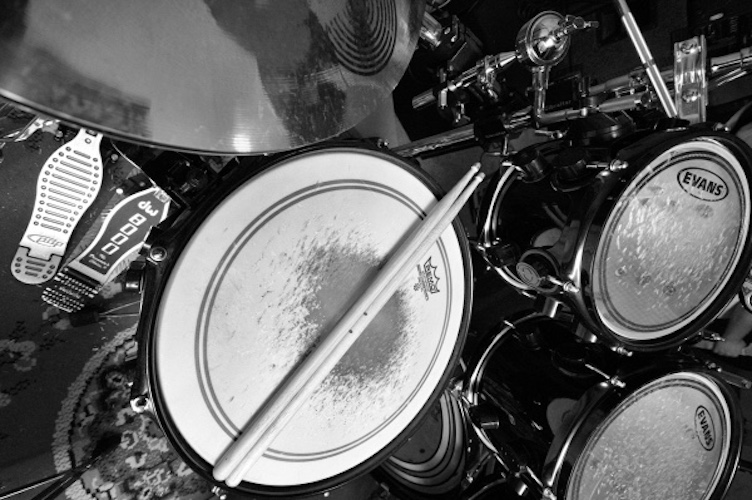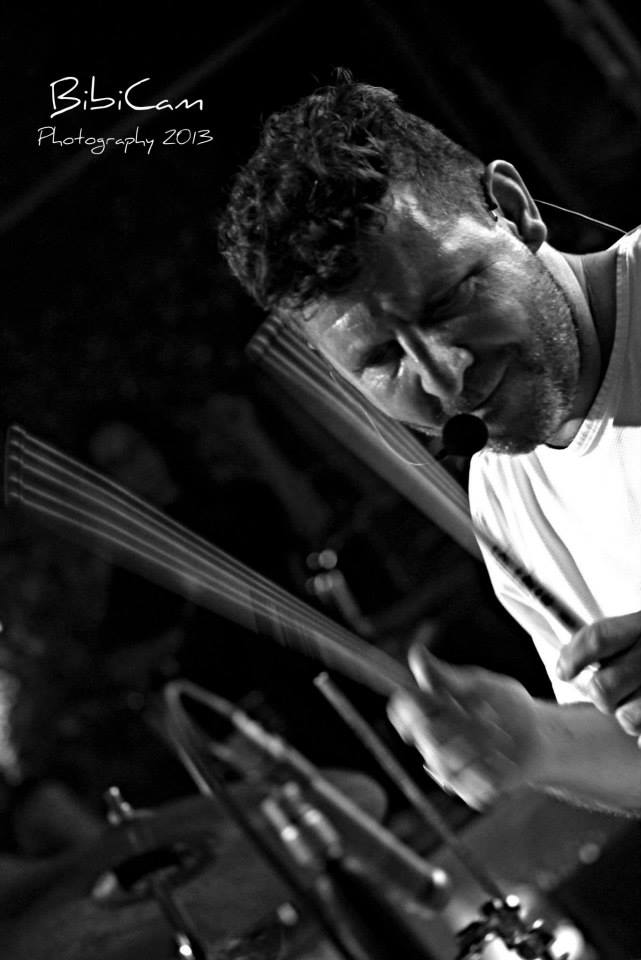You only get better by playing.
You only get better by playing.
Buddy Rich
Music is a central component of our emotional makeup. Rhythm even more: It’s primal instinct.
I noticed that when most of the children at open-air concerts of the music school big band gathered in groups next to or near my drumset. A few years later it dawned on me that drums are the easiest instrument to grasp visually and, above all, emotionally.
You immediately understand what’s happening and how it works. All other instruments require reading music and barely visible dexterity. The drummer, on the other hand, hits drums and cymbals, plays loudly or softly and dictates the dynamics of a song, often the entire concert.
I didn’t know any of this when I was four years old drumming on anything I could find in the house. Mainly in the kitchen. Probably to spare my mother’s nerves, I was given a drum. In the years that followed, I received another piece of equipment on any gift-worthy event, and soon had a complete drum kit.

I learned to play from the Beatles, specifically Ringo Starr. Sheet music is one thing, feeling the music on the other hand is essential. Technique is best learned through playing. You learn a language primarily through real communication with people, grammar serving only as a supporting tool. Music is played. Ideally, together with other musicians or with a record.
That’s how I drummed along with the Beatles, the Stones, Pink Floyd, ELO, Queen, Toto, The Police, Peter Gabriel and, thanks to my parents, also with Santana and Wolfgang Dauner. There isn’t any better school than that.
Of course, lessons are important, no question about it: notes help you understand and learn drumming techniques. But you don’t practise these in a quiet room; you play them to a good song. Disco and electronic music were the perfect background for flams and double bass drum clinics. Like I said, nothing replaces or even comes close to the feel of playing. You can’t learn that through theoretical study or marathon sessions in soundproofed solitary confinement. You learn it by listening and imitating. Just like you learn to speak.
When playing music, you take up one thing above all else: dynamics, and you’re learning from experts. Why does a song need rhythmic structure (Charlie Watts), when does a song need which groove (Jeff Porcaro), when does it need drive (Stewart Copeland), when does it need elegance (Manu Katché)? And how do rhythmic dynamics work anyway? The latter was explained to us by Omar Hakim, who reduced his speed within a single bar (correct: 1,2,3,4) after the first beat, then paused and slightly accelereated from beat 3-4. No, Hakim is not a drum physicist. Pretty much everyone knows him without knowing: he recorded the drums of the entire Dire Straits album Brothers in Arms. In two days.
During my childhood my bedroom was the stage and my parents’ borrowed hi-fi system was my mixing desk. A few years and several exploded tweeters later, I went to music school, joined a big band, formed my first school band and took jazz lessons at the Frankfurt Conservatory. Eventually, I moved to Berlin to study and immersed myself in the local big city music scene. There weren’t enough rehearsal rooms before or after the fall of the Berlin Wall, but I was extremely lucky in that regard. And from then on, I learned more about dynamics in music and, above all, within a band: musicians’ personalities and sensitivities. But also about the enormous importance and incredible thrill of live gigs. Production and sound design… simply everything.
“I love being a drummer. Everyone thinks you’re dumb. What they don’t realise is that if it weren’t for you, their band would suck.”
Dave Grohl
Through my first student job at Joachim Flebbes’ cult film shop, I met a bass player who took me along to an LP project with a singer signed to Polydor. Before I knew it, I was in the studio, on stage and even on TV. Super exciting, but stylistically more like a kind of German Bon Jovi shmooze rock. The need emerged for a project with more kick – it was the 90s and hard music was all the rage. Die Bunten Hunde were a wonderful team: rock/funk/pop grooves, funk bass, Lukather-style guitar, good keys and a charismatic young Berliner on the mic gave us cool gigs in Berlin clubs, especially in the musically awakening east of Berlin.
However, we were a few years too early. Only the big names and Die Fantastischen Vier were allowed to sing in German. By the time the music industry finally rediscovered the German language, we were all long gone and had jobs. And a good thing too. I never wanted to be a professional and play drums all day anyway. In the early 90s, I had the opportunity to work as a stage technician at the House of World Cultures with the fantastic Vinnie Colaiuta. It was the absolute dream for every drummer. But then Colaiuta is also at the top of his game because he only puts his drumsticks down to eat. The rest is technical training, studio and live music, 24/7. You have to want it, and those around you have to put up with it. I didn’t want it.
There is a small, very refined and well-connected music scene here in Malta. Important to note that creative hobbies such as painting, dancing or music are highly regarded across all sectors of Maltese society, the effort involved is respected and encouraged. During a company presentation, I once talked to then Prime Minister Gonzi about a teenager in his family and the difference between death and doom metal – and the man knew his stuff. In Germany, if you admit to being a musician to a politician or top manager, you are labelled a hobo.
For 15 years, I’ve been playing in cover bands pkaying well-known songs from the 60s and funky 70s to pop, rock, alternative and good chart hits, sometimes fusing them together: Superstitious by Stevie Wonder works great with the riff and groove of Rage Against The Machine. So the portfolio is quite diverse.
There was also a great album project with my band CitzenOne, which came to an abrupt end due to Covid lockdown. Two expats among us wanted to return home. The keyboardist went back to his family in Finland, and our American singer believed that the USA would handle the pandemic most professionally.
Well…

A few excerpts from the Bandcamp Portfolio.
Music for posterity. Since I started playing in bands during my studies and up until today, I’ve been in the studio. In Berlin with the Bunten Hunde with a mix of Fanta4 and Chili Peppers in German. And then in Malta with a rather soft, pre-produced pop album.

